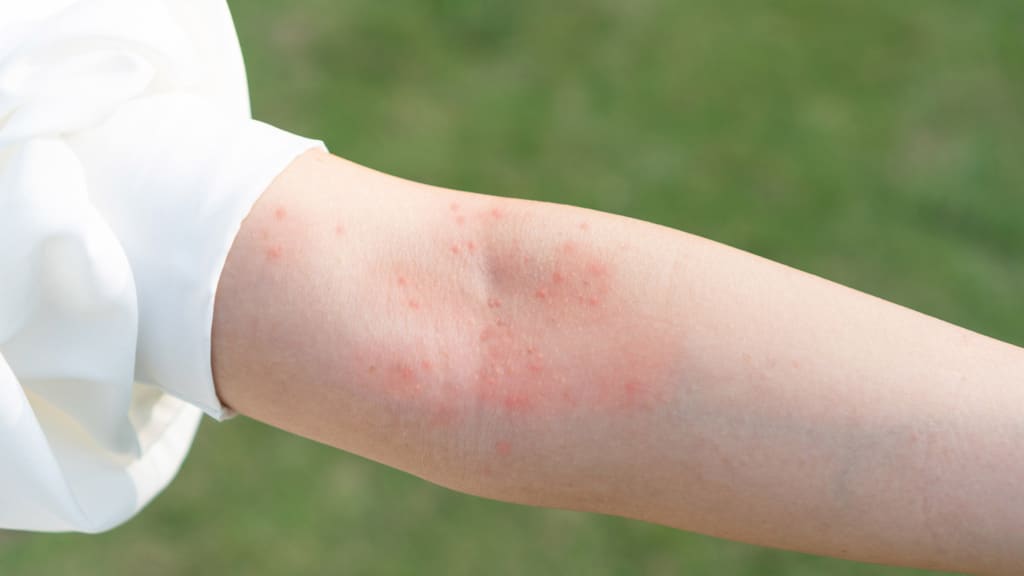 go back
go back
 go back
go back
No Fun in the Sun. Managing Eczema Symptoms During the Summer Months
Summer is a time to relax and enjoy the sun, but for those who suffer from eczema, the season can also be a time of discomfort and frustration. With the increased heat and humidity, as well as exposure to the sun, eczema can become more irritated and inflamed. However, with some tips and tricks, it is possible to manage eczema during the summer months.
What is Eczema?
Eczema is a chronic skin condition that is characterized by dry, itchy, and inflamed skin. According to the National Eczema Association (NEA), over 31 million people in the United States currently suffer from eczema, and it’s estimated that as many as 1 in 10 individuals will develop the disease within their lifetime.
Also known as atopic dermatitis, the NEA reports that up to 80% of children who are diagnosed with eczema will outgrow the condition by the time they reach adolescence or early adulthood. Though, for some, it will be a lifelong battle.
Eczema is not contagious. And while there is no known cure for the condition, it can be managed with the proper care.
Symptoms of Eczema

Eczema can look different on everybody. The most common symptom of eczema is itching, which can range from mild to severe.
Other symptoms of eczema include:
- Red, dry patches of skin
- Rashes that may ooze, weep clear fluid, or bleed when scratched
- Thickening or hardening of the skin
Because eczema looks different on every person, it will present differently on different skin tones. The Allergy and Asthma Foundation of America (AAFA) emphasizes that eczema may look ashen (whiteish gray), purple, or dark brown on darker skin tones and red on skin tones that are lighter.
Symptoms can come and go sporadically. When eczema symptoms are dormant, they are said to be in remission. But the return of symptoms, also known as ‘flare-ups’ can happen at any time, on any part of the body, or on multiple parts of the body simultaneously.
Common Eczema Triggers
The root cause of eczema is not currently known. But there are common triggers that can exacerbate the condition and make symptoms worse. The six most common eczema triggers are:
- Soaps and household cleaners
- Metals like nickel
- Rubber products like latex gloves
- Allergens such as pet dander or dust mites
- Perfumes, dyes, and other fragrances
- Formaldehyde
As noted by the American College of Allergy, Asthma, and Immunology (ACAAI), there are three other major contributors that can trigger eczema flare-ups: stress, illness, and changes in the weather.
Remember that eczema is extremely specialized. Triggers vary by person. Lifelong triggers might change for one person.

On The Blog: Avoiding Allergens While Doing the Laundry
Certain chemicals in laundry detergent and fabric softeners can cause skin irritation and allergy so it’s important to understand the dos and don’ts of doing laundry.
Read MoreManaging Eczema in the Summer Months
It is no surprise that due to eczema’s highly individualized nature, some people experience a worsening of symptoms during the summer months. While it may not be possible to avoid the outdoors for the duration of the season, there are some things you can do to help minimize the chance of a flare-up:
- Stay hydrated: The heat and humidity can cause the skin to become more dry and prone to eczema flare-ups. Drinking plenty of water and using a moisturizer regularly can help to keep the skin hydrated and prevent eczema from worsening.
- Avoid sunburns: People with eczema have sensitive skin, and exposure to the sun can cause the skin to become inflamed and irritated. Wearing protective clothing, such as hats and long-sleeved shirts, and using a broad-spectrum sunscreen with an SPF of at least 30 can help to protect the skin from the sun’s harmful rays.
- Try not to sweat: Sweating can cause the skin to become more irritated, and can also lead to bacterial infections. Taking cool showers, using a fan or air conditioning to stay cool, and wearing loose-fitting clothing can all help to prevent sweating and reduce the risk of eczema flare-ups.
- Maintain a healthy lifestyle: This includes eating a healthy diet, getting regular exercise, and managing stress. A healthy lifestyle can help to boost the immune system and reduce the risk of eczema flare-ups.
In the event of an eczema flare-up, applying a cool compress to the affected area can help to reduce inflammation and relieve itching.
Eczema and Pollen
Pollen is another potential environmental trigger for eczema, especially during the summer months due to pollen’s small, granular nature and how the grains are carried by the winds. Because the skin is more fragile to being with, when someone who suffers from atopic dermatitis comes into contact with a pollen spore, it can cause eczema symptoms to occur.
Some ways to protect yourself from pollen during the summer months are:
- Monitor pollen and mold counts.
- Keep windows and doors shut at home and in your car
- Take a shower, wash your hair, and change your clothes after spending time outdoors
- Wear glasses or sunglasses outdoors to help keep pollen out of your eyes
Get Help Managing Your Eczema and Allergy Symptoms!
Both eczema and allergies are unique as the person that experiences them. Regardless of your specific needs, with many locations across the country, there is an AllerVie Health specialist who can work with you to determine your needs and work with you to establish the best eczema or allergy management and long-term treatment plan. Request an appointment today!

Medically Reviewed By: Maxcie Sikora, MD
Reviewed on: April 19, 2023
Our team of writers, editors, and medical experts goes over each article carefully to make sure the information is correct and that only reliable sources are used.
We regularly check to see if the info in this article matches up with the latest scientific research and expert advice so that we can give you the most up-to-date information. See list of trusted resources here.
Get Help Managing Your Allergy Symptoms
Both eczema and allergies are unique as the person that experiences them. With several locations nationwide, AllerVie Health specialists can assess your needs and provide the optimal eczema or allergy management and long-term treatment plan.
Make an Appointment